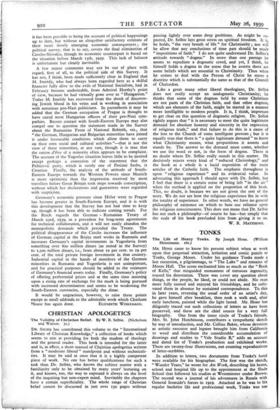CHRISTIAN APOLOGETICS
The Validity of Christian Belief. By W. B. Selbie. (Nicholson and Watson. 5s.)
DR. SELBIE has contributed this volume to the "International Library of Christian Knowledge," a collection of books which seems to aim at providing for both the student of theology and the general reader. This book is intended for the latter and is, in effect, a short manual of Chtistian apologetics written from a "moderate liberal" standpoint and without technicali- ties. It may be said at once that it is a highly competent piece of work. No one has better qualifications for such a task than Dr. Selbie, who knows the subject matter with a familiarity only to be obtained by many years' lecturing on it, and knows, too, the way to expound it always on the level of the inquiring but non-expert mind. Inevitably the chapters have a certain superficiality. The whole range of Christian belief cannot be discussed in just over 150 pages without passing lightly over some deep problems. As might be ex- pected, Dr. Selbie lays great stress on spiritual freedom. It is, he holds, "the very breath of life" for Christianity ; nor will he allow that any conclusions of time past should be made "impositions of faith." I do not quite understand Dr. Selbie's attitude towards "dogma." In more than one passage he seems to repudiate a dogmatic creed, and yet, I think, he himself holds a dogma in the sense that he asserts there are some beliefs which are essential to Christianity. Thus when he comes to deal with the Person of Christ he states a doctrine which is substantially the same as that of the Council of Chalcedon.
Like a great many other liberal theologians, Dr. Selbie does not really accept an undogmatic Christianity; he thinks that some of the dogmas held by some Christians are not parts of the Christian faith, and that other dogmas, which are elements of the faith, might be started in a manner more intelligible to modern people. It is, I think, important to get clear on this question of dogmatic religion. Dr. Selbie rightly argues that "it is necessary to meet the quite legitimate demand for absolute honesty and sincerity in the expression of religious truth," and that failure to do this is a cause of the loss to the Church of some intelligent persons ; but it is equally true that there is "a quite legitimate demand" to know what Christianity means, what propositions it asserts and stands by. The answer to the demand must come, whether we use the word or not, in the form of dogma. There is no doubt where Dr. Selbie really stands in this matter. He decisively rejects every kind of "reduced Christology," and the book as a whole is a lucid exposition of the main articles of the Catholic faith. The emphasis throughout is upon "religious experience" and its evidential value. In advocating this approach I should agree with Dr. Selbie, but I feel that there is a certain sense of being left "in the air" when the method is applied on the proportion of this book. This, no doubt, is because we are not given the rest of the story. We do not see how the religious experience fits in with the totality of experience. In other words, we have no general philosophy of existence on which to base our reliance upon the religious consciousness. This does not mean that Dr. Selbie has not such a philosophy—of course he has—but simply that the scale of his book precluded him from giving it to us.
W. R. MArrxEws.


























































 Previous page
Previous page